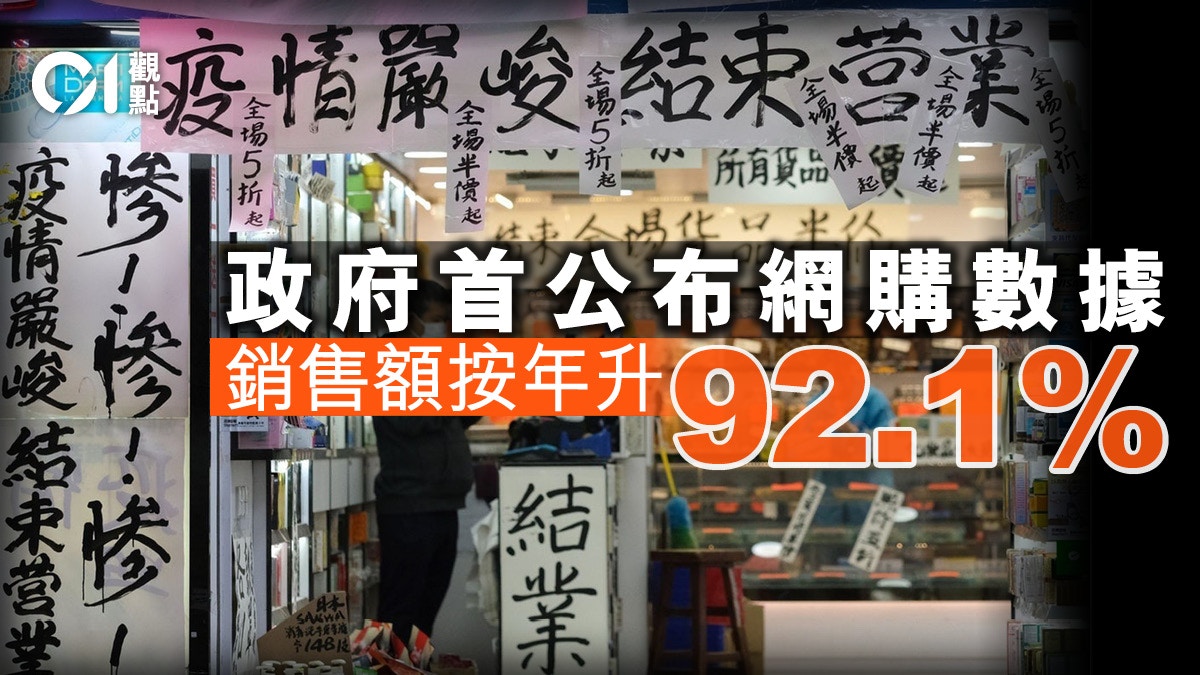01 view
Written by: Commentary Editing Room
2021-03-05 07:00
Last update date: 2021-03-05 07:00
The government released retail sales data on Wednesday (3rd). The value of retail sales in Hong Kong in January was 32.6 billion yuan, down 13.6% year-on-year. Taking into account the retail sales data in January this year, Hong Kong has fallen for 24 consecutive months.
However, due to the impact of the epidemic, the value of online retail sales in January this year was temporarily estimated at 2.4 billion yuan, an increase of 92.1% year-on-year, accounting for 7.3% of the total retail sales value.
The difficult operating environment of physical stores during the epidemic actually reflects the dilemma of high local rents.
The Census and Statistics Department began to collect online sales data of the retail industry from January 2020, and it was also published for the first time this time.
The prescription counts the online sales value of the retail industry from January last year to January this year. In addition to the findings mentioned above, online sales in Hong Kong have also increased rapidly since the outbreak of the epidemic in February last year.
From the beginning of last year, online sales only accounted for 3.3% of the total retail sales in Hong Kong. In line with the deterioration of other retail sales data during the same period, online sales once rose to 9.4% in November last year, making online sales a miracle in the epidemic market.
The outbreak of the epidemic in Hong Kong has increased the market share of "storeless retail" and spawned the transformation of traditional retail stores to online sales.
Statistics show that the total sales value of "storeless retail" in January last year was only 647 million, and it has grown to close to 1 billion in the next January. As for other retailers, the transformation actions are even more obvious. Their online sales The value has risen from 587 million in January last year to 1.375 billion in January this year.
The retail transformation forced by the epidemic has doubled the total online sales of the retail industry in just one year.
The government released retail sales data on Wednesday (3rd). The value of retail sales in Hong Kong in January was 32.6 billion yuan, down 13.6% year-on-year. Taking into account the retail sales data in January this year, Hong Kong has fallen for 24 consecutive months.
(Photo/Photo by Ou Jiale)
The road of transformation forced by rent
Before the epidemic, due to the abundance of physical stores in Hong Kong and online sales waiting for the shopkeepers to deliver goods, in some cases, online stores were even more inconvenient than physical stores.
However, the number of tourists in Hong Kong has plummeted after the epidemic, and the flow of people in the market has decreased during the severe epidemic. The advantage of physical stores in the flow of people is no longer there. In the end, only the high rent burden is left.
The property rental index of the Rating and Valuation Office is based on the 100 in 1999. At the end of 2019 before the outbreak of the epidemic, the private retail building rental index was as high as 181.8, more than double the rate in Shashi.
Although the epidemic once reduced shop rents, according to the provisional figures in January this year, the rent index has risen to 174.6.
Retail business in Hong Kong has been greatly affected, but rental expenditures have remained stable. It is not easy to do business in this real estate-led economy.
Since the outbreak of the epidemic, tenants have been asking for rent reductions, but there have always been a small number of commercial tenants who can be "considered" by their owners.
For example, a shoe store in Tai Wing Lane, Tai Po, which has been in business for 20 years, has been increased in rent by a total of 2.3 times over the years. It was eventually "grabbed" by another group with a contract to increase rent by 25%; there were also mini shops upstairs in Tsim Sha Tsui that bucked the market. The rent was increased by 20%, forcing tenants to form a major coalition to protest.
Some landlords have even filed for rent chasing. Even the international brands in Harbour City are not immune. The plight of other small, medium and micro enterprises can be imagined.
Whether online sales will still become the mainstream of the retail industry after the epidemic is currently uncertain.
(Profile picture)
Is it better to buy a home than to start a business?
The rental cost in Hong Kong is high. Although the increase in land prices and shop rents has created wealth for landlords in terms of numbers, their contribution to the real economy has been limited. It has not been able to create more job opportunities and has even stifled many entrepreneurial ideas in the past.
Many people complain that the business environment in Hong Kong is dominated by companies that can afford huge rents, and small shops cannot survive.
The rise of online stores means that entrepreneurs aspiring to avoid high rents and blaze a trail in the real estate-led economy.
However, whether online sales will continue to become the mainstream of the retail industry after the epidemic is currently uncertain.
But the only certainty is that the stable local rents under the epidemic are more like telling Hong Kong people that "it is better to buy a home than to start a business." This is definitely not a good thing for the city's economic development and business.
How the society will reverse this morbid economy and revitalize local industries in the future is a major issue that the government and the entire society should reflect on.
Zara's parent company closes 1,200 stores, is Hong Kong ready for economic transformation?
Xintian Shopping City's end of life, tourism and retail industry urgently need to be transformed
The biggest worry in the tourism industry is not a trade war but an internal problem?
Rent Retail Retail Statistics 01 Viewpoint











/cloudfront-eu-central-1.images.arcpublishing.com/prisa/KMEYMJKESBAZBE4MRBAM4TGHIQ.jpg)



